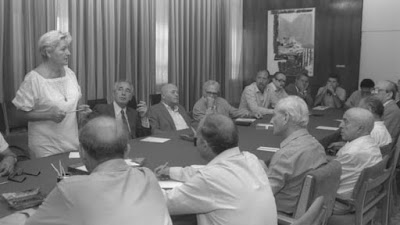The Israeli anti-Netanyahu camp is longing for a country that never was
 |
| Gideon Levy 08/09/2019 |
Long before Netanyahu’s attacks on Channel 12, nearly all of Israel’s media was in service to the government.
The hatred for Benjamin Netanyahu, which is sometimes justifiable and sometimes overblown, revives a tried-and-true tendency in Israel, the longing for what used to be, and even more so, the longing for what never was. We are living in a time of a dystopian competition: Who is better at frightening an audience by describing the disasters outside Israel’s gate – a state governed by religious law; the end of democracy; the end of the state; the end of the world.
Apocalypse now, and there’s nothing more natural than to glamorize the past, to miss what used to be, to glorify what never was. Israel the beautiful and the just, before the scoundrel came to power; its ruination after his reign of 13 years. The truth is that things were better before Netanyahu, but not as good as people say. It’s worse today, but not as bad as the laments suggest
Israel has always longed for its past and embellished it. In 1960, Hed Arzi Music issued a double album, “Hayo Hayu Zmanim” (“Once Upon a Time: Israeli Hit Tunes of Yesteryear”), a live recording of a concert held at Tel Aviv’s Mann Auditorium (now the Bronfman Auditorium). At barely 12 years old, the state was already longing for its past. They were the first records in most Israeli homes. We played them dozens of times, in a premature, over-the-top bursts of nostalgia. It’s how we were taught to miss the right things and not to know the rest. Sixty years later and the song’s the same: They say things were happy here before I was born, as Yehonatan Geffen wrote*.
Today the nostalgia of deceit focuses on the exemplary democracy, the free media and the glorious secularism that thrived here once and are no more. Because of Netanyahu, of course. In all of Israel’s 71 years, there was just one — the amazing 1966-67 — without military rule in some part of the territory under the state’s control. Can you believe it? In the first 18 years of the state there was military rule within its sovereign borders, imposed on part of its citizens solely due to their national identity.
Democracy? Not even as a joke. Many people’s career depended on their being in possession of a party membership card, long before politicization was a topic of discussion. For years the Supreme Court, in its cowardice, evaded making a decisive ruling on the occupation, long before the fatal wounding of the gatekeepers. Arabs and radical leftists were subject to persecution and surveillance that no one would dare to conduct today. Israel was much more of a Shin Bet security service state then, and the Israel Defense Forces were considered much more sacred.
That was long before Netanyahu. Long before the prime minister’s depraved attacks on Channel 12, there were media outlets here that could not by any stretch of the imagination be called free. Most of the newspapers were party mouthpieces. The Editors’ Committee, an anti-democratic institution by definition, controlled the information that was transmitted to the public, in shameful cooperation with the authorities, and the Military Censor deleted and suppressed much more than it does today.
Nearly all of Israel’s media was in service to the government, the director general of the Prime Minister’s Office served as the editor in chief of public radio — the only radio there was. Most journalism served a single narrative, nationalist and patriotic, even more than today. The 1956 Kafr Qasem massacre and the terrible mass slaughter in the Jordanian village of Qibya in 1953 were concealed from the public for days, with the submissive complicity of the supposedly free press. Before Netanyahu.
Before Netanyahu there was no secularism of the type that today is so afraid of being wiped out. The secular schools of our childhood were much more religious than today’s. Bible verses at the morning assembly; mandatory kippot for boys in every Bible and Talmud class; kissing the Bible if it fell on the floor, heaven forbid; and the “holiday of receiving the book,” that is, the Torah, in second grade — all in that bastion of secularism, Tel Aviv.
The city was sealed shut on Shabbat, much more than it is today. Movies on Shabbat? The corner grocery? A shopping mall? Barely one on-call pharmacy at the edge of town. Long before today’s religionization.
Long before religionization and the destruction of democracy it might have been happier here, but not the way people describe it. Netanyahu destroyed and did damage, but he wasn’t the first.
Tlaxcala’s Note
From the song “Yachol Lihiyot Shezeh Nigmar”—“Maybe it’s all over”, sung by Arik Einstein on his 1973 album “Good Old Eretz Yisrael” : “They say it was happy here before I was born, and everything was wonderful until I arrived. A Hebrew watchman on a white horse in the dark night. By the shores of Lake Kinneret Trumpeldor was a hero. Little Tel Aviv, red sands, one Bialik … Once, they say, there was a lovely dream here. But when I came to see, I didn’t find a thing. Maybe it’s all over.”


